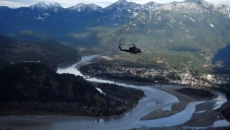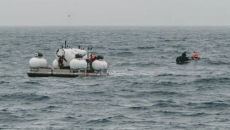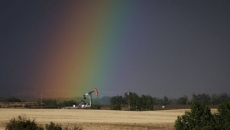British Columbia wildfire officials have warned of an uptick in lightning-caused wildfires later this week, heading into the hottest, driest stretch of the summer.
Cliff Chapman, operations director for the BC Wildfire Service, said the lightning that's expected to be "widespread" across the province is more likely to hit higher, mountainous terrain, but strikes are also possible in or around communities.
It's still early in the summer and wildfires have already scorched nearly 10,500 square kilometres of land in B.C., he told a news conference on Wednesday.
That represents the third-highest burned area ever recorded in B.C., and Chapman said he believes it's possible 2023 may surpass the previous record.
The majority of the burned area is in northeastern B.C., a region that Chapman said hasn't seen a break since the wildfire season took off in April.
To bolster firefighting capacity, 60 personnel from the United States were expected to arrive in B.C. on Thursday, along with 100 firefighters from Mexico, he said.
"In the next few days, those resources will help support our fire suppression efforts in the north, allowing us the ability to rest some of our own staff, and also allowing us the ability to have preparedness resources ready for new starts in the south."
Matt MacDonald, the lead forecaster for the wildfire service, said the latest guidance from Environment Canada projects a high probability of above-normal temperatures persisting through to August, raising the risk of ignitions.
There's also no relief in sight from persistent drought conditions. Small amounts of rain won't be enough to reduce the stress in B.C.'s forests, he told the briefing.
That forecast comes on the heels of an especially hot and dry June, when many areas of the province received 70 to 80 per cent less rain than usual, he said.
The role of climate change cannot be ignored in assessing heat waves, drought and wildfire conditions in the province, MacDonald added.
"We're seeing exactly what climate change experts have been alerting us to, which is a higher frequency of extreme weather events," he said, noting seven of the province's 10 busiest wildfire seasons on record have occurred in the last decade.
Both officials emphasized the importance of detecting fires quickly after they start. Chapman thanked members of the public for making reports that helped crews douse or hold three dozen out ofmore than 40 new blazes sparked over the Canada Day long weekend, the majority of which were caused by lightning, he said.
Additional campfire bans are on the way in response to the increasing risk.
As of noon on Friday, Chapman said campfires will no longer be permitted in the Kamloops Fire Centre and all areas of the Coastal Fire Centre, except Haida Gwaii.
Campfires have been banned since last month across the Prince George Fire Centre and in the driest sections of the Northwest and Coastal fire centres, including Vancouver Island.
Campfires no larger than half-a-metre by half-a-metre are permitted in the Cariboo and Southeast fire centres, where wildfire danger is mostly ranked as moderate.
About 100 blazes are currently burning across the province, including a 5,715-square-kilometre fire south of Fort Nelson that's the largest ever recorded in B.C.






